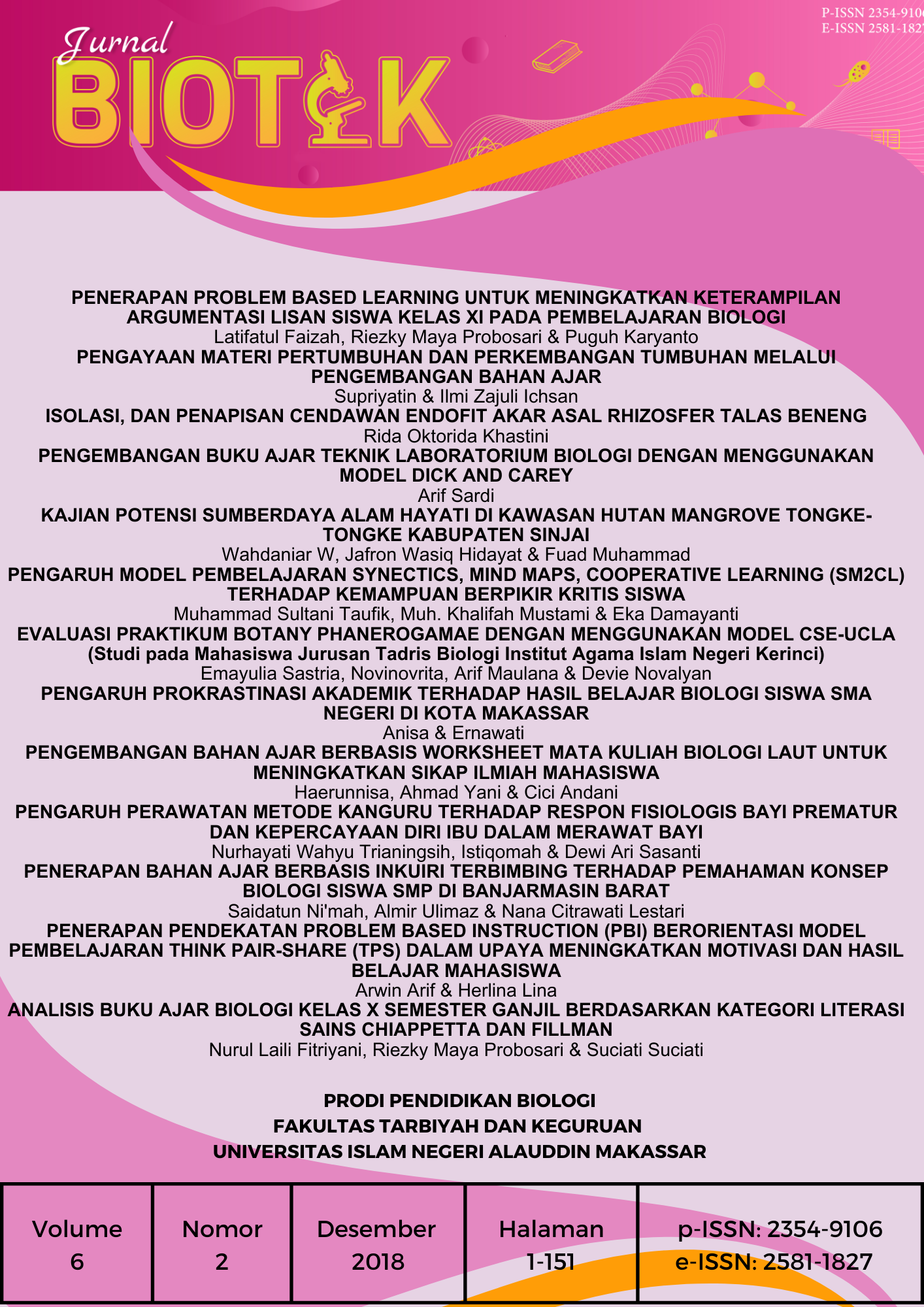PENERAPAN PROBLEM BASED LEARNING UNTUK MENINGKATKAN KETERAMPILAN ARGUMENTASI LISAN SISWA KELAS XI PADA PEMBELAJARAN BIOLOGI
Abstract
Abstrak
Penelitian bertujuan untuk meningkatkan keterampilan argumentasi lisan siswa. Jenis penelitian ini adalah penelitian tindakan kelas (classroom action research) dengan penerapan Problem Based Learning yang meliputi lima tahapan pembelajaran, yaitu problem encounter, problem analysis and learning issues, discovery and reporting, solution presentation and reflection, dan overview integration and evaluation. Subjek penelitian adalah siswa kelas XI MIPA di salah satu SMA di Surakarta yang berjumlah 37 siswa (19 laki-laki dan 18 perempuan). Teknik pengumpulan data dengan observasi, wawancara, dan dokumentasi proses pembelajaran biologi. Teknik analisis data menggunakan teknik analisis deskriptif kualitatif dan prosedur penelitian tindakan kelas mengikuti model penelitian dari Coghlan & Brannick. Penilaian keterampilan argumentasi lisan siswa mengacu pada McNeill & Krajcik terdiri dari claim, evidence, dan reasoning. Hasil penelitian menunjukkan adanya peningkatan keterampilan argumentasi lisan siswa mengalami peningkatan dari level rendah ke level sedang dengan rata-rata skor keterampilan argumentasi lisan siswa pada prasiklus 0,19, siklus I 1,43, dan siklus II 3,49, serta rata-rata skor 5 pada siklus III. Berdasarkan hasil penelitian disimpulkan bahwa ada peningkatan keterampilan argumentasi lisan siswa melalui Problem Based Learning di kelas XI MIPA pada pembelajaran biologi.
Kata kunci: keterampilan argumentasi lisan, pembelajaran biologi, penelitian tindakan kelas, problem based learning.
Downloads
References
Berland, L. K., & McNeill, K. L. (2010). A learning Progression for Scientific Argumentation: Understanding Student Work and Designing Supportive Instructional Contexts. Science Education, 765-793.
Chin, C., & Osborne, J. (2010). Supporting Argumentation Thriugh Students' Questions: Case Studies in Science Classroom. Learning Science, 19 (2): 230-284.
Coghlan, D., & Brannick, T. (2010). Doing Action Research in Your Own Organization. London: Sage.
Cross, D., Taasoobshirazi, G., Hendricks, S., & Hickey, D. T. (2008). Argumentation: A strategy for improving achievement and revealing scientific identities. International Journal of Science Education, 30 (6): 837-861.
Evagorou, M., & Osborne, J. (2013). Exploring Young Students' Collaborative Argumentation Within a Socioentific Issue. Journal of research in science teaching, 50 (2): 209-237.
Kultuca, A. Y., Cetin, P. S., & Dogan, N. (2014). Effect of Content Knowledge on Scientific Argumentation Quality: Cloning Context. Journal of Science and Mathematics Education, 8 (1): 1-30.
McNeill, K. L., & Krajcik, J. (2008). Scientific Explanations: Caharacterizing and Evaluating the Effects of teachers' Instructional Practices on Student Learning. Journal of Research in science Teaching, 45 (1): 53-78.
McNeill, K. L., & Krajcik, J. (2009). Synergy Between Teacher Practices and Curricular Scaffolds to Support Students in Using Domain-Specific and Domain-General Knowledge in Writing Arguments to Explain Phenomena. The Journal of The Learning Sciences, 18; 416-460.
Roshayanti, F., & Rustaman, N. Y. (2013). Pengembangan Asesmen Argumentatif Untuk Meningkatkan Pola Wacana Argumentasi Mahasiswa pada Konsep Fisiologi Manusia. Bioma, 2 (1): 85-100.
Syaifudin, A., & Pratama, H. (2013). Pengembangan Buku Teks Menulis Argumentasi Berdasarkan Pola Penalaran Argumentatif. Jurnal Penelitian Pendidikan, 30 (1): 1-10.
Tan, O. S. (2007). Problem-Based Learning Pedagogies: Psychological Processes and Enhancement of Intellogences. Educ Res Policy Prac , DOI 10.1007/s10671-007-9014-1, 6: 101-114.
Wulandari, B., & Surjono, H. D. (2013). Pengaruh Problem Based Learning Terhadap Hasil Belajar Ditinjau Dari Motivasi Belajar PLC Di SMK. Jurnal Pendidikan Vokasi, 3 (2): 178-191.
Copyright (c) 2018 Latifatul Faizah, Riezky Maya Probosari, Puguh Karyanto

This work is licensed under a Creative Commons Attribution-ShareAlike 4.0 International License.
Authors who publish with Jurnal Biotek agree to the following terms: Authors retain the copyright and grant Universitas Islam Negeri Alauddin Makassar right of first publication with the work simultaneously licensed under a Creative Commons Attribution License (CC BY-SA 4.0) that allows others to share (copy and redistribute the material in any medium or format) and adapt (remix, transform, and build upon the material) the work for any purpose, even commercially with an acknowledgement of the work's authorship and initial publication in Universitas Islam Negeri Alauddin Makassar. Authors are able to enter into separate, additional contractual arrangements for the non-exclusive distribution of the journal's published version of the work (e.g., post it to an institutional repository or publish it in a book), with an acknowledgement of its initial publication in Universitas Islam Negeri Alauddin Makassar. Authors are permitted and encouraged to post their work online (e.g., in institutional repositories or on their website) prior to and during the submission process, as it can lead to productive exchanges, as well as earlier and greater citation of published work (See The Effect of Open Access).

This work is licensed under a Creative Commons Attribution-ShareAlike 4.0 International License.



